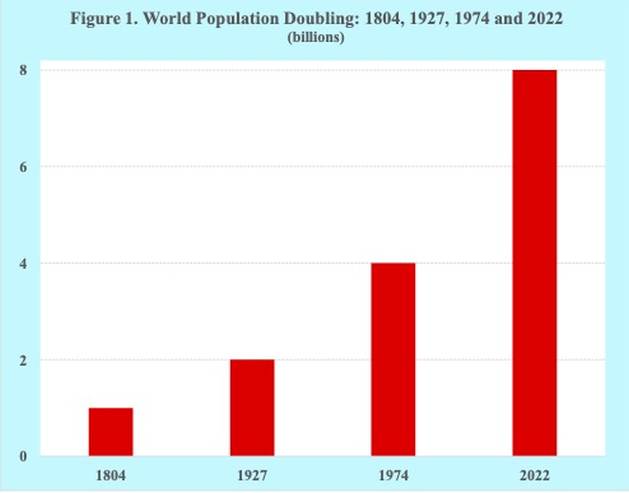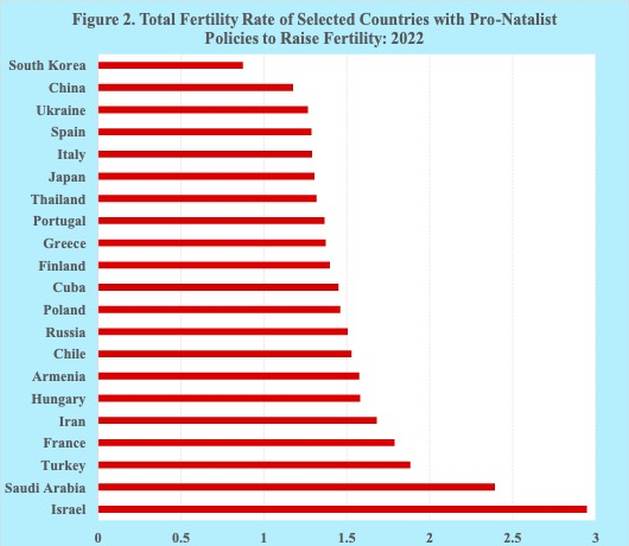PORTLAND, USA, Oct 27 (IPS) – Among the various troubling human addictions, the one having the most worrisome consequences for humanity and planet Earth is population growth.
Some addictions, such as illicit drug use, tobacco smoking, alcohol abuse, gun violence and junk food consumption, are contributing to chronic diseases, illnesses, injuries and the premature deaths of millions of men, women and children. The sustained growth of human populations, however, is far more troubling as it is undermining the wellbeing of humanity.
As it contributes to the climate crisis, environmental degradation, biodiversity loss, natural resource depletion and pollution, world population growth poses a serious threat to the sustainability of humans on the planet. Concerned with its serious and far reaching consequences, climatologists, environmentalists, scientists, celebrities and others have repeatedly called for human population stabilization, with some urging gradually reducing the size of world population.
Despite those calls and warnings of life on the planet being under siege, the proponents of continued demographic growth, including many elected government officials, business leaders, investors and economic advisors, have by and large disregarded the widely available evidence on the consequences of population growth, especially on climate change and the environment. In both their policies and actions, they have dismissed the warnings and recommendations urging for world population stabilization and its gradual reduction.
Pro-growth proponents erroneously claim that the numerous cited consequences of population growth on the world’s climate, environment, biodiversity, natural resources and human wellbeing are greatly exaggerated and amount to simply fake news. Some have even called climate change a hoax and ignore warnings that the time for action is running out with the world entering uncharted territory and humanity making minimal progress in combating climate change.
Also, some proponents of population growth argue that the consequences of climate change, including higher average temperatures, severe droughts and hurricanes, excessive heat waves, floods, rising sea levels and high tides, melting Antarctic ice shelves, degraded environments, record wildfires, endangered wildlife, exploited natural resources and increased pollution, should be calmly and resolutely brushed aside.
Less than one hundred years ago, i.e., in 1927, world population reached 2,000,000,000. Less than fifty years later, i.e., in 1974, the planet’s human population doubled to 4,000,000,000. And nearly fifty years later in 2022, world population has doubled again to 8,000,000,000 (Figure 1).

Despite the calls for the stabilization of human populations, any slowdown in the growth of population is typically viewed with concern, alarm, panic and fear. Economic growth, advocates claim, requires sustained population growth. In brief, they see a growing population vital to the production of more goods and services leading to higher economic growth.
Besides being viewed as fundamental for economic growth, pro-growth advocates consider population growth essential for profits, taxes, labor force, politics, cultural leadership and power.
Any slowdown in a country’s demographic growth, such as has been experienced by some countries during the past decade and expected for even more countries in the coming decades, is met by political, business and economic leaders ringing alarm bells and warning of economic calamities and national decline.
Calls for limited immigration in order to achieve population stabilization are also strongly resisted, particularly by businesses and special interest groups. Reducing immigration levels, they often claim, is incompatible with the needs for labor, the promotion of innovation and sustained economic growth.
Some have even claimed that population decline due to low birth rates is a far bigger risk to civilization than climate change. In addition, as others have stressed, worker shortages coupled with population ageing are having social and economic repercussions, especially with regard to the financial solvency of national retirement pension programs.
The pro-growth advocates warn of a pending population crisis due to low fertility rates, many of which are below the replacement level. Their solution to the low fertility levels is to encourage the public, in particular women, to have more babies.
Since 1976, the proportion of countries with government policies to raise fertility levels has tripled from 9 to 28 percent. Europe has the highest proportion of countries seeking to raise fertility rates at 66 percent, followed by Asia at 38 percent.
Many governments have introduced various pro-natalist policy measures to raise fertility levels. Those measures include tax incentives, family allowances, baby bonuses, cash incentives, government loans, maternal and paternal leave, publicly subsidized child care, flexible work schedules, parental leave and campaigns aimed at changing public attitudes.
Of the 55 countries with policies to raise fertility, nearly three-quarters of them have low fertility and one-third have a total fertility rate lower than 1.5 births per woman. The populations of those 55 countries range in size from more than 1.4 billion to less than 10 million. The diverse group of countries seeking to raise their fertility levels includes Armenia, Chile, China, Cuba, France, Hungary, Iran, Israel, Italy, Japan, Poland, Russia, Saudi Arabia, South Korea, Spain, Thailand, Turkey and Ukraine (Figure 2).

In addition to policies aimed at raising fertility levels, nearly 40 percent of countries have relied on immigration to increase their rates of population growth. Without immigration, the population of some of those countries, such as Australia, Canada and the United States, would also decline in size due to below replacement fertility levels.
Many of those calling for ever-increasing populations are simply promoting Ponzi demography, a pyramid scheme that makes sustainability impossible. In general, economists don’t talk about the scheme and governments won’t face it. Also, the underlying strategy of the Ponzi demography scheme is to privatize the profits and socialize the economic, social and environmental costs incurred from ever-increasing populations.
Many provinces, cities and local communities also seek to have growing populations and lament slowdowns and declines in demographic growth. By and large, population stabilization is viewed as “population stagnation”, which they maintain not only suppresses economic growth for businesses but also reduces job opportunities for workers. At the same, however, the claim is made that population slowdowns are contributing to worker shortages.
In contrast to the dire warnings of population stagnation or collapse, others believe that lower fertility and smaller populations should be celebrated rather than feared. In addition to positive consequences for climate change and the environment, lower birth rates are frequently linked to increased education of women, greater gender equality, improved health levels and higher living standards.
Despite the calls for population stabilization, the world’s addiction to population growth is likely to persist for some time. World population is expected to continue growing throughout the 21st century, likely reaching 10,000,000,000 by 2058.
Moreover, more than half of the global population growth between today and midcentury is expected to occur in Africa. The populations of many sub-Saharan African countries are likely doubling in size over the coming several decades.
In sum, the repeated warnings by scientists, commissions and concerned others about the serious consequences of human population increase for climate change, the environment, pollution and sustainability appear insufficient to modify the addiction to demographic growth any time soon. As a result, possible future policies and programs aimed at addressing those consequences are likely to be too little and too late to mitigate the profound effects of population growth on the planet and humanity.
Joseph Chamie is a consulting demographer, a former director of the United Nations Population Division and author of numerous publications on population issues, including his recent book, “Population Levels, Trends, and Differentials”.
© Inter Press Service (2023) — All Rights ReservedOriginal source: Inter Press Service
















